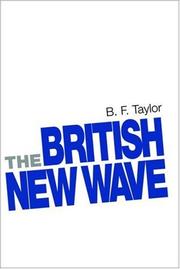| Listing 1 - 2 of 2 |
Sort by
|

ISBN: 1781701210 184779193X 9781847791931 9781781701218 0719069084 9780719069086 Year: 2006 Publisher: Manchester Manchester University Press
Abstract | Keywords | Export | Availability | Bookmark
 Loading...
Loading...Choose an application
- Reference Manager
- EndNote
- RefWorks (Direct export to RefWorks)
This book offers an opportunity to reconsider the films of the British New Wave in the light of forty years of heated debate. By eschewing the usual tendency to view films like A Kind of Loving and The Entertainer collectively and include them in broader debates about class, gender, and ideology, this book presents a new and innovative look at this famous cycle of British films. For each film, a re-distribution of existing critical emphasis also allows the problematic relationship between these films and the question of realism to be reconsidered. Drawing upon existing sources and returning to
Motion picture industry --- Billy Liar. --- British New Wave. --- British films. --- Kind of Loving. --- class. --- film criticism. --- film interpretation. --- gender. --- ideology. --- realism.
Book
ISBN: 1282355600 9786612355608 0520909666 9780520909663 9781282355606 Year: 1989 Publisher: Berkeley University of California Press
Abstract | Keywords | Export | Availability | Bookmark
 Loading...
Loading...Choose an application
- Reference Manager
- EndNote
- RefWorks (Direct export to RefWorks)
"Let me tell you a story," each film seems to offer silently as its opening frames hit the screen. But sometimes the film finds a voice-an off-screen narrator-for all or part of the story. From Wuthering Heights and Double Indemnity to Annie Hall and Platoon, voice-over narration has been an integral part of American movies.Through examples from films such as How Green Was My Valley, All About Eve, The Naked City, and Barry Lyndon, Sarah Kozloff examines and analyzes voice-over narration. She refutes the assumptions that words should only play a minimal role in film, that "showing" is superior to "telling," or that the technique is inescapably authoritarian (the "voice of god"). She questions the common conception that voice-over is a literary technique by tracing its origins in the silent era and by highlighting the influence of radio, documentaries, and television. She explores how first-person or third-person narration really affects a film, in terms of genre conventions, viewer identification, time and nostalgia, subjectivity, and reliability. In conclusion she argues that voice-over increases film's potential for intimacy and sophisticated irony.
Voice-overs. --- Motion picture plays, American --- Motion pictures --- History and criticism. --- adaptation theory. --- adaptations. --- all about eve. --- annie hall. --- barry lyndon. --- book to movie. --- documentary film. --- double indemnity. --- exposition. --- film adaptation. --- film criticism. --- film interpretation. --- film studies. --- film technique. --- film theory. --- film. --- filmmaking. --- how green was my valley. --- literature. --- media. --- naked city. --- narration. --- narrative theory. --- narrative. --- newsreels. --- nonfiction. --- opening frames. --- platoon. --- popular culture. --- radio. --- red river. --- silent film. --- storytelling. --- television. --- tv. --- voice over. --- wuthering heights.
| Listing 1 - 2 of 2 |
Sort by
|

 Search
Search Feedback
Feedback About UniCat
About UniCat  Help
Help News
News